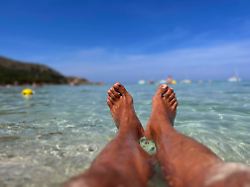Crises? Which crises?
“Traveling is an absolute priority”
October 20, 2023, 2:45 p.m
Listen to article
This audio version was artificially generated. More info | Send feedback
Neither wars, inflation nor a weak economy can break the German desire to travel. The need to catch up after doing without during the Corona crisis is still high. But customers “want to get something for their money,” says Nadine Schwanz, Germany boss at Booking.com.
Neither wars, inflation nor a weak economy can break the German desire to travel. The need to catch up after doing without during the Corona crisis is still high. Customers “want to get something for their money,” says Nadine Schwanz, Germany boss at Booking.com, in the “Zero Hour” podcast.
Despite all the wars and crises: people are traveling on a large scale again. To what extent do you notice this with booking?
Nadine Sting: We see that very clearly in our numbers. We generated 280 million overnight stays worldwide in the second quarter, an increase of nine percent compared to the previous year and also more than in 2019, the year before the Corona crisis. People want to make up for the time they couldn’t travel.
So you don’t let inflation and high prices stop you?
That doesn’t scare people away. We see this in the studies we regularly conduct. Over 70 percent of those surveyed say that the cost of living is rising, but they still don’t want to miss out on traveling. But then they also want to get something for their money and decide, for example, on longer trips. But it’s clear: traveling is an absolute priority for people.
There are always allegations from hotel operators against Booking. It means that the providers provide the infrastructure and Booking skims off the cream. What do you say to them?
First of all, we are not the only sales channel for providers. In Europe, hotels typically have six to seven different channels.
But booking is already dominant.
We are definitely a big player in Europe, but there are certainly other providers as well. Only one in four bookings in Europe is made via an online platform. And over 60 percent are still booked directly. In addition, our business model is that we are a marketing platform. The operators can join us at no cost and without registration fees. And we then market the partners all over the world, in 45 languages, in every search engine you can imagine. He only has to pay a fee if he actually stays overnight.
The fees are around 15 percent?
That’s the average commission, yes. But what’s important is that if the hotel did the online sales itself, it wouldn’t be free. Google optimization also costs money. There are 70 percent individual hotels in Germany. They couldn’t even create the reach that we bring them. How should a hotel in the Bavarian Forest appeal to customers in Japan?
Another accusation is that the order of search results is also influenced by whether the provider pays for good placement. Is that correct?
First of all, we have a personalized ranking that is based on the customer’s profile. In addition, some partners are given a thumbs up in a special program. Anyone who meets certain quality criteria can register. And they pay a higher percentage to be listed at the top. But just because someone pays more money doesn’t mean they’re in first place, there’s a detailed algorithm behind it.
But is payment already a component of the placement?
Yes, but it is not the exclusive aspect. The conversion rate is more important to us than the commission paid.
During the pandemic, many hotels have offered significantly more favorable cancellation policies to get people to book in the first place. What’s left of it?
Booking behavior has changed significantly. There is a sharp increase in short-term bookings. And there is a great need to book flexibly. Ultimately, that is the decision of the hotel partner. We advise and point out what customers want, that is also part of our job. But the partners decide for themselves.
Booking wants to grow and offer more than just accommodation. What should that look like?
Our long-term vision is what we call the “connected trip”. So it’s about the entire travel experience. Looking for support during the trip, but also after the trip. We want to become a central marketplace for travel. In addition to accommodation, you can also book a rental car and a flight or train with us. Or even visits to sights. But that won’t be all.
Nils Kreimeier spoke to Nadine Schwanz. The conversation has been shortened and smoothed for better readability
Listen in the new episode of “Zero Hour“
- What role the German market plays for booking
- How the reviews on the platform are created
- How large the proportion of bookings are made via smartphone
You can find all episodes directly here RTL+, Apple or Spotify or via Google.
